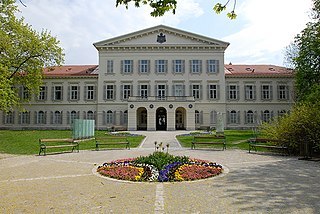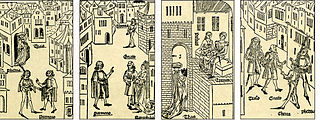The following outline provides an overview of and topical guide to entertainment and the entertainment industry:

The Salzburg Festival is a prominent festival of music and drama established in 1920. It is held each summer, for five weeks starting in late July, in Salzburg, Austria, the birthplace of Wolfgang Amadeus Mozart. Mozart's operas are a focus of the festival; one highlight is the annual performance of Hofmannsthal's play Jedermann (Everyman).

Johann Adam Hiller was a German composer, conductor and writer on music, regarded as the creator of the Singspiel, an early form of German opera. In many of these operas he collaborated with the poet Christian Felix Weiße.

Mannheim National Theatre is Germany's biggest theatre that records over 3,000 artistes from different surrounding theatres.
The Broward Center for the Performing Arts is a large multi-venue performing arts center located in downtown Fort Lauderdale, Florida, United States.

The performing arts community in Louisville, Kentucky is undergoing a renaissance. The Kentucky Center, dedicated in 1983, located in the downtown hotel and entertainment district, is a premiere performing arts center. It features a variety of plays and concerts, and is the performance home of the Louisville Ballet, Louisville Orchestra, Broadway Across America - Louisville, Music Theatre Louisville, Stage One, KentuckyShow! and the Kentucky Opera, which is the twelfth oldest opera in the United States. The center also manages the historic W. L. Lyons Brown Theatre, which opened in 1925 and is patterned after New York's acclaimed Music Box Theatre.
Since the 18th century Berlin has been an influential musical center in Germany and Europe. First as an important trading city in the Hanseatic League, then as the capital of the electorate of Brandenburg and the Prussian Kingdom, later on as one of the biggest cities in Germany it fostered an influential music culture that remains vital until today. Berlin can be regarded as the breeding ground for the powerful choir movement that played such an important role in the broad socialization of music in Germany during the 19th century.

Theater am Kärntnertor or Kärntnertortheater was a prestigious theatre in Vienna during the eighteenth and nineteenth centuries. Its official title was Kaiserliches und Königliches Hoftheater zu Wien.

Johann Wolfgang von Goethe was a German polymath, who is widely regarded as the greatest and most influential writer in the German language. His work has had a profound and wide-ranging influence on Western literary, political, and philosophical thought from the late 18th century to the present day. A poet, playwright, novelist, scientist, statesman, theatre director, and critic, his works include plays, poetry and aesthetic criticism, as well as treatises on botany, anatomy, and color.
Erwin und Elmire is a singspiel, described as a Schauspiel mit Gesang, in two acts by the German composer Johann André, with a libretto by Johann Wolfgang von Goethe, after Oliver Goldsmith's ballad of Angelica and Edwin, The Hermit, in chapter 8 of his sentimental novel The Vicar of Wakefield.

The Cologne Opera refers to both the main opera house in Cologne, Germany and its resident opera company.

The Royal Theater Carré is a Neo-Renaissance theatre in Amsterdam, located near the river Amstel. When the theatre was founded in 1887, it was originally meant as a permanent circus building. Currently, it is mainly used for musicals, cabaret performances and pop concerts. Carré is located next to the Amstel, close to Waterlooplein. Its address is Amstel 115 and has approximately 1,700 seats.

Abel Seyler was a Swiss-born theatre director and former merchant banker, who was regarded as one of the great theatre principals of 18th century Europe. He played a pivotal role in the development of German theatre and opera, and was considered "the leading patron of German theatre" in his lifetime. He supported the development of new works and experimental productions, helping to establish Hamburg as a center of theatrical innovation and to establish a publicly funded theater system in Germany. Working with some of Germany's foremost actors and playwrights of his era, he is credited with pioneering a new more realist style of acting, introducing Shakespeare to a German language audience, and with promoting the concept of a national theatre in the tradition of Ludvig Holberg, the Sturm und Drang playwrights, and serious German opera, becoming the "primary agent for change in the German opera scene" in the late 18th century. Already in his lifetime, he was described as "one of German art's most meritorious men."

The University of Music and Performing Arts Graz, also known as Kunstuniversität Graz (KUG) is an Austrian university. Its roots can be traced back to the music school of the Akademischer Musikverein founded in 1816, making it the oldest university of music in Austria.

Deutsche Wanderbühne is the term for roving German-speaking, theatrical troupes or travelling operas, consisting of professional actors and musicians. They were financially independent but did not have their own fixed stage.
Carl Ignaz Anton Demmer, also Karl, was an operatic tenor at the Vienna court opera, and possibly Florestan in the first version of Beethoven's opera Fidelio on 20 November 1805, then titled Leonore, oder Der Triumph der ehelichen Liebe.
The Frankfurter Museums-Gesellschaft is a cultural association in Frankfurt, Hesse, Germany, which is responsible for the Frankfurt museum concerts. It manages the Frankfurter Opern- und Museumsorchester, which is both the municipal orchestra of Frankfurt and the orchestra of the Oper Frankfurt. Concerts take place in the Alte Oper concert hall. The orchestra is regarded as an important German symphony orchestra.
The Loh-Orchester Sondershausen is an orchestra from Sondershausen founded around 1600. It influenced Music in Germany in the 19th century by helping the music of Richard Wagner and Franz Liszt to achieve a breakthrough.

The history of the theatre in Cologne, Germany, has its roots in the Middle Ages. Although there are references to the existence of a Late antiquity Cologne theatre in the Roman Colonia Claudia Ara Agrippinensium, as has also been proven for other Roman cities. Despite this culture of theatrical play cultivated in the Roman past, a direct link to this time and form does not take place until centuries later. Although Cologne was one of the most important cities in Europe in the Middle Ages, the city had no significance in the theatre sector. The indecisiveness of the mayors over the centuries marked Cologne as an exception among major German cities in the field of theatre. After the revival of this art, theatre in Cologne also underwent a change to modern history.

The Hans Otto Theatre, named after the actor Hans Otto, is a municipal theatre in Potsdam in Germany. Its headquarters and main venue is in the Großes Haus am Tiefen See in Potsdam's cultural district on Schiffbauergasse. Other regular venues are the neighbouring historic Reithalle and occasionally the Palace Theatre in the Neues Palais.













